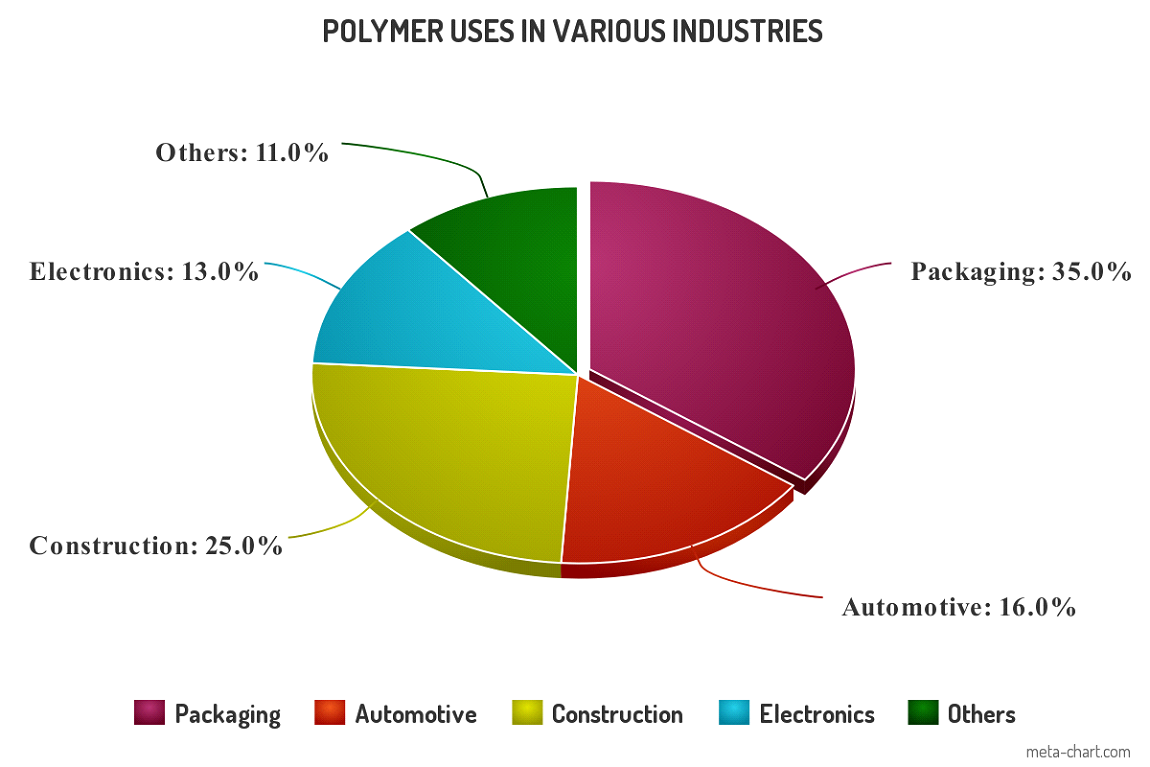The Polymer Revolution: Incredible Uses of Polymers in Everyday Life and Industries.

In the broad spectrum of materials science, there is one class of compounds that has truly revolutionized our modern world – Polymers. These versatile and adaptable molecules, composed of repeating units, have found their way into nearly every aspect of our lives. From everyday household products to cutting-edge industrial equipment, polymers play an indispensable role in shaping our society.
In this blog post, we will explore the diverse uses of polymers and highlight their significance across various domains. So, let’s dive in and buy polymers online from PolyMart that shape the present and future.
What are Polymers?
The word “polymer” originates from the Greek; poly means many and meros means units. Polymers are compounds that chemically bond together to form long chains or networks, also called macromolecules, constructed from repeating subunits known as monomers.
Polymers have different structures and properties, which can be altered by adjusting the monomer composition and the way they are processed. These versatile materials have revolutionized many aspects of modern life and continued to become the backbone of industrial sectors.
What are the Types of Polymers?
Polymers are classified into several different types based on various criteria. The following are some common types of polymers. Have a look
Types of Polymers Based on Sources
There are several common types of polymers categorized based on their origin.
Natural Polymers: Natural polymers are nature’s own miracles, found in plants, animals, and microorganisms. These polymers occur naturally and can be extracted directly from their sources. E.g. Cellulose, starch, proteins, DNA/RNA, etc.
Synthetic Polymers: Synthetic polymers are a type of material that is created in laboratories and industries through ingenious chemical reactions. These synthetic polymers are masterfully crafted to meet our everyday needs. E.g.: Polyethylene, polypropylene, plastic synthetic and etc.
Semi-synthetic Polymers: Semi-synthetic polymers are modified versions of natural polymers. They occur naturally but undergo clever chemical modification to improve properties and create an entirely new material. Example includes rayon, eyewear frames, textiles, etc.
Types of Polymers Based on Molecular Forces
The following are the types of polymers based on properties:
Thermoplastics : These polymers have a unique characteristic that sets them apart. They can be heated and melted, allowing to mould them into desired shapes easily without significant degradation,
Thermosets : These polymers are a little different from their thermoplastic counterparts. These polymers undergo a permanent chemical change upon heating and cannot be re-melted or re-molded.
Elastomers : Elastomers possess a remarkable ability to stretch and deform when a force is applied, only to return to their original shape once the force is removed.
Fibres : Fibres are formed from natural & synthetic polymers. They have a thread-like structure, possessing intermolecular force. Due to their strong attraction force, they have strong and high tensile strength. Examples – Natural fibre: cotton, silk wool, Synthetic fibre: rayon, nylon, polyester
Types of Polymers Based on Structure
The following are types of polymers that are based on their various structures. Let’s explore a few commoners.
Linear Polymers: These polymers feature long, straight chains, with little to no branching. Examples include polyethylene, polypropylene and high-density polypropylene can be counted as a linear polymer.
Branched Polymers: Branched polymers feature side chains or branches hanging from the main polymer chain. Example includes lower-density polyethylene and polyvinyl chloride.
Crosslinked Polymers: Crosslinked polymers also known as thermosetting polymers have strong covalent bonds between the polymer chains, creating a three-dimensional network. Examples: epoxy resin, vulcanized rubber etc.
Types of Polymers Based on Grades
The following are the different types of polymers based on the grades.
Commodity Grade Polymers: These polymers are characterized by basic properties, and they are commonly used in packaging, consumer goods, automotive parts, etc. E.g. Polyethene (PE), polypropylene (PP), AND P
Polystyrene (PS).
Engineering Grade Polymers: Engineering grade polymers have improved mechanical, thermal, and chemical properties that meet the specific needs of all applications. E.g. Glass Fiber Reinforced Polyamide (PA-GF) or Carbon Fiber Reinforced Polycarbonate (PC-CF).
Styrene Polymers: Styrene polymers encompass a group of polymers derived from styrene monomers. E.g. Polystyrene (PS), expandable polystyrene (EPS), and acrylonitrile butadiene styrene (ABS).
Speciality Polymers: These are polymers designed to meet a particular need or industry. E.g. Ethylene vinyl acetate (EVA), polyvinyl chloride (PVC) and, thermoplastic elastomers (TPE).
Biodegradable Polymers: Biodegradable polymers are ideal for packaging and disposable items because they degrade naturally over time. E.g. polylactic acid (PLA), polyhydroxyalkanoates (PHA), and polybutylene succinate (PBS).
What are the Uses of Polymers?
Polymers have a wide range of uses due to their unique properties and outstanding offerings. The following are some common uses of polymers and examples of polymers in daily life. Have a look!
Packaging industry: PE and PP are commonly used in plastic bags, and food & beverage packaging.
Cloth and Textiles:Polymers like polyester, nylon, acrylic are used to make fabrics for clothing, upholstery and etc.
Household Products: PP, PS or PVC are commonly used in household objects like, foam cups, pipes, plumber fittings, storage containers etc.
Personal Care Products: Polymers are found in various personal care products like PEG in shampoos, Polyacrylamide in hair styling and PP in toothbrushes.
Medical industry: Polymers play a significant role in the medical industry as well. The polymer grade polyurethane and polyethene are used in catheters and surgical implants.
Construction industry:In the construction industry polymers are widely used in various applications like PVC in flooring, PE in insulation materials, etc.
Automotive industry: Polymers are extremely used in the automotive sector for manufacturing various components like PU foams used in car seats, PP in bumpers, PE in fuel tanks etc.

Conclusion: Where to Buy Polymers Online?
The use of polymers has been highly influential in many industries. When looking for quality polymers in India, it can be difficult to find reliable polymer suppliers. However, thanks to PolyMart, it is now easier to buy and sell polymers online than ever before. PolyMart serves as a centralized platform connecting buyers and sellers, offering a convenient solution for procuring high-quality polymers at competitive prices.
With the PolyMart App, users gain access to a wide array of polymer types, including PP, LDPE, LLDPE, HDPE, PVC, ABS, NYLON, SAN, EVA, and POE. Additionally, the app keeps users informed about the latest price trends for specific polymer categories.
Experience the convenience of PolyMart today by installing the app and simplifying your polymer procurement and sales processes.
With the PolyMart App, users gain access to a wide array of polymer types, including PP, LDPE, LLDPE, HDPE, PVC, ABS, NYLON, SAN, EVA, and POE. Additionally, the app keeps users informed about the latest price trends for specific polymer categories.
Experience the convenience of PolyMart today by installing the app and simplifying your polymer procurement and sales processes.